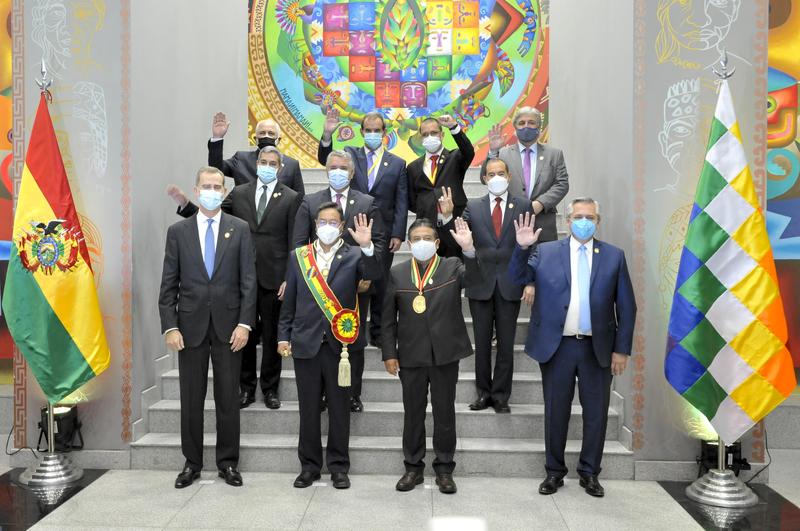 In this photo provided by the Bolivian Presidential Office, from left to right first row: Spain's King Felipe VI, Bolivia's new President Luis Arce, Vice President David Choquehuanca, Argentina's President Alberto Fernandez, second row: Paraguay's President's Mario Abdo Benítez, left, and Colombian President Ivan Duque, center, third row: Iran's Foreign Minister Mohammad Javad Zarif, left, and Venezuela's Foreign Minister Jorge Arreaza, second right, pose for a photo during the inauguration in La Paz, Bolivia, Nov 8, 2020. (BOLIVIAN PRESIDENTIAL OFFICE VIA AP)
In this photo provided by the Bolivian Presidential Office, from left to right first row: Spain's King Felipe VI, Bolivia's new President Luis Arce, Vice President David Choquehuanca, Argentina's President Alberto Fernandez, second row: Paraguay's President's Mario Abdo Benítez, left, and Colombian President Ivan Duque, center, third row: Iran's Foreign Minister Mohammad Javad Zarif, left, and Venezuela's Foreign Minister Jorge Arreaza, second right, pose for a photo during the inauguration in La Paz, Bolivia, Nov 8, 2020. (BOLIVIAN PRESIDENTIAL OFFICE VIA AP)
LA PAZ - Bolivia’s new president, Luis Arce, has moved swiftly to restore ties with Iran and Venezuela, receiving the credentials of ambassadors from the two countries on Wednesday, just three days after his socialist party retook the reins of power.
Venezuela and Iran were key allies for Bolivian President Luis Arce’s ally and former president Evo Morales, who, along with President Nicolas Maduro of Venezuela, frequently sympathized publicly over what they called US “meddling” in the region
Bolivia’s government said in a statement it wanted to “reestablish diplomatic relations damaged by the previous de-facto government” led by conservative interim president Jeanine Anez.
Writing on Twitter, Arce said he was restoring bilateral relations with Venezuela “to strengthen strategic ties for the good of our peoples”.
He said the same was being done with Iran and that “they are always welcome in Bolivia. We will continue to strengthen common projects.”
Iran’s foreign minister Javad Zarif attended Arce’s swearing-in ceremony in La Paz on Sunday as part of a tour of leftist Latin American nations that included Venezuela and Cuba.
ALSO READ: Bolivia's Arce vows to 'rebuild' as landslide election win confirmed
Venezuela and Iran were key allies for former Bolivian president and Arce ally Evo Morales, who swept to office as the country’s first indigenous president in 2006 and resigned under pressure over disputed elections last year.
Morales had planned to make Iran a partner in the exploitation of its bountiful lithium reserves, while he and longtime ally President Nicolas Maduro of Venezuela frequently sympathized publicly over what they called US “meddling” in the region.
But days after Anez took power last November, Venezuelan diplomats and Cuban doctors were expelled amid accusations by the interim government that they had fomented unrest following Morales’ departure.
Now, with the return to power of Morales’ socialist MAS party - with Arce at the helm following elections in October - Bolivia is resetting its foreign policy once more.
On Monday, Morales returned to Bolivia from exile in Argentina and on Wednesday he was feted in a ceremony in Chimore, a town in his native Chapare province, a central coca-growing region.
READ MORE: Bolivia electoral body blocks Morales senate run
In a speech, Morales urged Latin American nations to maintain their sovereignty over natural resources.
“The West, that is the industrialized countries, only wants us Latin Americans so that we can guarantee them raw material,” he said in a broadcast speech.
Arce did not attend the event and has not yet referred publicly to the return of Morales, whom he has said will play no role in his government.


